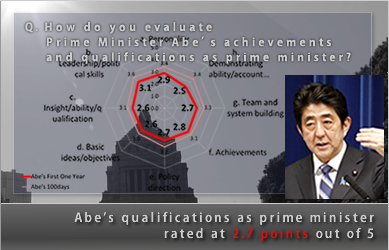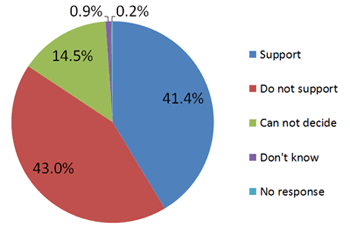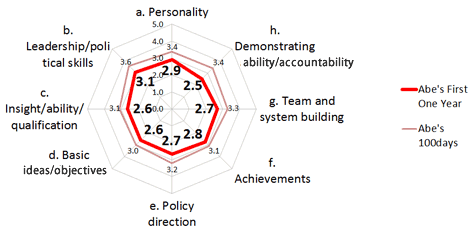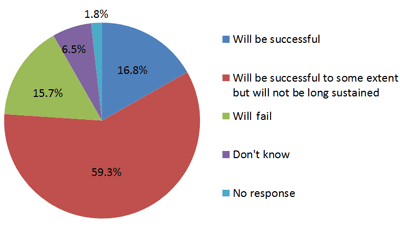 The Genron NPO believes that in order to achieve "a strong democracy" in Japan, materials for considering the course of Japan's politics must be provided to the people and based on this belief, periodically provides a variety of information to voters so that they can think about the political issues that concern them.
The Genron NPO believes that in order to achieve "a strong democracy" in Japan, materials for considering the course of Japan's politics must be provided to the people and based on this belief, periodically provides a variety of information to voters so that they can think about the political issues that concern them.
On Dec. 26, Prime Minister Shinzo Abe's administration will enter its second year. On this particular occasion, The Genron NPO carried out an evaluation of the administration's policy performance for its first year and in parallel, a questionnaire was sent to intellectuals to collect their views about the government's achievements in the past year. The results of the evaluation and the questionnaire were announced Dec. 20. In the questionnaire, replies were obtained from 447 people, mainly entrepreneurs, media industry people, academics, researchers and bureaucrats. The latest studies were the second surveys following those carried out toward the 100th day, April 4, 2013, since the inauguration of the Abe administration.
Supporters outnumber non-supporters, severe views of Abe administration increase
In the questionnaire, non-supporters of the Abe administration outnumbered supporters. Specifically, 41.4 percent of the respondents supported the administration while 43.0 percent did not. The supporters had surpassed half of those who answered the questionnaire on the occasion of the 100th day. Therefore, the latest result means that a greater number of people had a severe view of the government's policy performance. Asked about the performance of the administration compared to expectations at the time of its inauguration, 34.9 percent replied that they had no expectations from the start while 14.8 percent said the government underperformed. A combined 49.7 percent gave a negative evaluation of the government's performance, surpassing 47.6 percent for those in favor of the government; 20.8 percent replied the government performed better than expected and 26.8 percent said the government performed well as expected. In the 100th day survey, a negative evaluation came from a combined 27.1 percent of the respondents -- 23.9 percent for those who had no expectations from the first and 3.2 percent for those who saw an underperforming administration. As a result, a severe evaluation increased by more than 20 points in this category. When asked about which policy area the government was primarily expected to focus on, the largest percentage of 41.4 percent mentioned measures to achieve "a strong economy" by forging a medium- to long-term growth strategy. Asked whether hopes can be pinned on the Abe administration's policies from now on, 43.2 percent replied in the negative, surpassing 30.4 percent for affirmative replies. This represents an increase of 24 points compared to 19.2 percent for negative replies in the 100th day survey.
Q1.Do you support the Abe Administration?

Abe's qualifications as prime minister rated at 2.7 points out of 5, biggest decline seen in demonstrating ability/accountability
The Genron NPO carried out a 100th day evaluation of the then prime minister's qualifications as head of government from the first Abe administration to the ensuing six administrations (led by Yasuo Fukuda, Taro Aso, Yukio Hatoyama, Naoto Kan, Yoshihiko Noda and then, Shinzo Abe again). Because the first Abe to Noda administrations were all short-lived, the latest 100th day evaluation was the first study of its kind. In this study, the prime minister's qualifications were evaluated in eight categories -- personality, leadership/political skills, insight/ability/qualification, basic ideas/objectives, policy direction, achievements, team and system building, and demonstrating ability/accountability.
Abe's qualifications received an average rating of 2.7 points out of 5. This was down 0.6 points from 3.3 points in the 100th day survey for his administration, but it retained a relatively favorable evaluation compared to the 100th day surveys for the previous administrations. Ratings declined for all eight evaluation categories. The biggest decline was recorded in demonstrating ability/accountability, down 0.9 points from the previous survey to 2.5 points. The most favorable evaluation was given to leadership/political skills, which received a rating of 3.1 points, down 0.5 points from the previous survey. Lack of accountability can be cited as a main reason for the increase in negative views of his administration.
Q2.How do you evaluate Abe's qualifications as prime minister?

Over half of respondents negative toward 17 of 34 items on Abe's policy agenda
Favorable replies about the government's policy performance -- the government has performed well or the government has performed poorly, but it is likely to do well from now on -- surpassed half of the respondents only for seven of the 34 items on the Abe administration's policy agenda. Two of them received favorable replies from over 60 percent of the respondents. The two categories were restoration of a close Japan-U.S. alliance, favorably evaluated by 65.3 percent, and the prime minister's leadership and command on decision-making, so evaluated by 60.2 percent.
Conversely, negative replies toward the government's policy efforts -- the government has not performed well or it is unlikely to do so -- surpassed half of the respondents in 17 categories. This far surpassed three categories in the 100th day survey. Eight of them received favorable replies from over 60 percent of the respondents, 68.2 percent for the government's efforts to solve a territorial issue with South Korea over a Sea of Japan island, called Takeshima by Japan and Dokdo by South Korea. The remaining seven items included efforts to correct a widening vote-value disparity among electoral districts across the country and a review of parliamentary election systems, favorably evaluated by 67.1 percent, Japan's leading role in the post-Kyoto Protocol process for combating global warming, 64.7 percent, and efforts to repair relations between Japan and China mainly by restarting leaders' meetings between the two countries, 64.2 percent. The series of findings indicates severe views spread on individual policy issues, too, among the voters.
Nearly 60 percent of intellectuals doubtful over effects of "Abenomics," negative views increase
Since Abe's return to power, bright signs have been emerging in the economy, as instanced by the yen's depreciation on exchange markets and continued increases in domestic stock prices, following measures taken in line with the so-called "Abenomics" economic policy mix. But 59.3 percent of the respondents sounded cautious about the administration's economic agenda, replying the series of measures will be successful to some extent but will not be long sustained. This kind of evaluation came from 53.9 percent of the respondents in the 100th day survey. The latest finding showed an increase of 5.4 points in the percentage of those who are cautious or negative about the effects of the administration's economic measures. In the latest questionnaire, 16.8 percent replied the administration's economic agenda will be a success, down from 17.7 percent in the previous study while 15.7 percent forecast a failure, up from 11.5 percent. The percentage of those who foresee a failure came close to that of positive views, indicating some intellectuals have come to doubt the government's economic policy will be successful.
Q3. Do you think the Abe Administration's economic measures will be successful?

About 60 percent negative on course of fiscal reconstruction, about 70 percent pessimistic on social security reform
Of the respondents, 58.6 percent said that it will be difficult for the government to rehabilitate Japan's fiscal condition if the existing efforts are continued to this end. Meanwhile, replies that the current efforts will make it possible to achieve the target of fiscal reconstruction came from only 2.0 percent. But 35.8 percent remained relatively positive on the course of fiscal reconstruction, replying the current efforts are unlikely to be successful, but it is not too late for the government to strive to attain the goal.
Asked whether the government will be able to reconstruct Japan's social security system amid the aging of society, negative replies came from 68.9 percent of the respondents. Of these, 33.6 percent replied it will be hard for the government to do so while 35.3 percent replied they are relatively negative toward such a possibility. Conversely, only 3.1 percent replied they expect social security reform to be achieved. Including the 23.0 percent for those who are relatively positive toward such a possibility, the combined percentage of favorable replies fell short of 30 percent.
Views divided on restart of nuclear power plants, about half of respondents opposed, about 40 percent in favor
Intellectuals' views divided as to whether Japan's nuclear power plants should be restarted after a break of over two and a half years since the Fukushima nuclear power plant accident of March 2011. The largest percentage of 33.8 percent replied "No" to the idea.
Separately, 14.3 percent replied they are relatively against restarting the nuclear plants. Including this group, a combined 48.1 percent of the intellectuals were against the restart of the plants. The percentage of intellectuals in favor of getting them going again came to 20.4 percent while 20.1 percent replied they are relatively in favor of doing so. The combined percentage of these favorable replies was 40.5 percent.
National secret protection law draws opposition from about half, support from 40 percent, 10 percent of respondents shift to non-supporter side on railroading of legislation
The largest percentage of 43.2 percent replied they are against the recent enactment of legislation to better protect national secrets while 9.4 percent replied they are relatively against. Combined, 52.6 of the intellectuals replied negatively toward the legislation. Favorable replies came from 19.5 percent of the respondents while 17.2 percent gave a relatively favorable evaluation. Combined, 36.7 percent of the intellectuals replied in favor of the law.
Asked whether views about the Abe administration changed following the railroading of the controversial legislation by the ruling Liberal Democratic Party in the latest parliamentary session, 34.9 percent replied they support the government as in the past while 40.5 percent said they do not support the government as in the past. Meanwhile, 9.2 percent of the intellectuals said they switched to the not-supporting group from the supporting group.
70 percent of respondents expect Abe to be in power until or beyond the end of Lower House members' current term
The largest percentage of 47.4 percent replied they expect the Abe administration to be in power through the end of the current term for House of Representatives members late in 2016 while 21.5 percent expected Abe to stay in power further. As a result, almost 70 percent of the respondents expected the Abe administration to be sustained in the years to come. Meanwhile, 19.5 percent predicted the administration is unlikely to be in power until the end of the current term for Lower House members.
The largest percentage of 36.7 percent replied that Japan's politics will be built around a single pole as the LDP's dominance of the political scene is seen to continue. This was almost unchanged from 36.4 percent in the 100th day survey. The second largest answer group of 19.7 percent predicted that party realignments and subsequent political confusion will be repeated in the Diet, Japan's parliament, leading to a loss of public trust in party politics. The latest finding was up 4.5 points from 15.2 percent in the 100th day survey.
The existing political parties drew a negative evaluation from a combined 52.5 percent of the respondents. This consists of 11.6 percent for those who are not pinning hopes on any existing parties and 40.9 percent for those who are not pinning hopes on most existing parties. The combined percentage grew about 6 points from 46.6 percent in the 100th day survey. Favorable views about the existing parties were expressed by 41.6 percent of the respondents, down nearly 5 points from 46.3 percent in the previous study. Specifically, 1.6 percent replied they are pinning hopes on all existing parties while 40.0 percent replied they are pinning hopes on some political parties.
Outline of Questionnaire
The Abe administration enters its second year Dec. 26, 2013. The Genron NPO has so far carried out questionnaires of intellectuals as part of its efforts to evaluate an individual government's policy achievements, starting with the first Abe administration, which was in power from 2006 to 2007, and published their results on each occasion.
The latest questionnaire, which concerned the current Abe administration, was the second of its kind following a study in April this year about his administration's policy performance in its first 100 days.
The questionnaire sent forms or e-mails in a period of about a week from early December to intellectuals in various fields who cooperate in Genron NPO activities, including experts, journalists, entrepreneurs and government bureaucrats. An analysis was made of replies received from 447 of them by Dec. 18, 2013. Of the respondents, males accounted for 86.6 percent and females 11.6 percent. By age category, 0.2 percent of them were teenagers while 3.6 percent were in their 20s, 6.7 percent in their 30s, 21.3 percent in their 40s, 28.0 percent in their 50s, 23.9 percent in their 60s, 13.2 percent were in their 70s and 2.0 percent were 80 or older. (The total does not equal 100 percent because some respondents gave no answers to certain questions. The same goes hereafter.) By occupation, entrepreneurs and senior business people accounted for 15.2 percent, company employees 13.4 percent, senior officials in the media 2.9 percent, media people 12.8 percent, national government officials 2.0 percent, local government officials 3.8 percent, Diet members 0.2 percent, local assembly members 0.4 percent, NPO and NGO officials 6.7 percent, academics and researchers 13.4 percent, people working with various organizations 7.2 percent, students 2.5 percent, self-employed people 4.5 percent and others 13.4 percent.
Post a comment